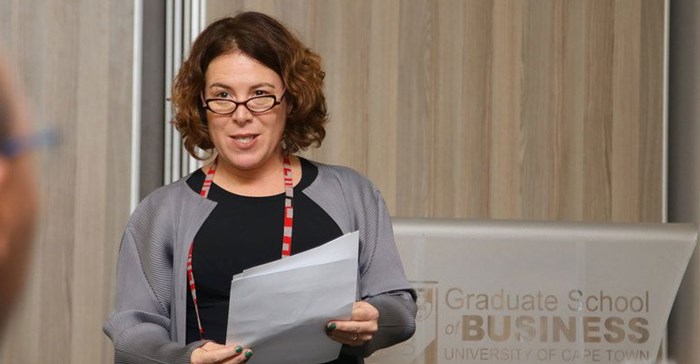The Department of Finance and Tax at the University of Cape Town (UCT) recently hosted a celebratory event to mark its 10-year anniversary.

Source: Je'nine May. Professor Suki Goodman, the dean of the Faculty of Commerce at UCT
The department came about as the result of the merger in 2012 of several other units in the Faculty of Commerce. The original sections of the department were situated, among others, in the University of Accounting, School of Economics and School of Management Studies.
Speaking at the celebratory event, the head of the department, Dr Lucian Pitt, identified three themes for the anniversary: celebration, transformation and collaboration. Pitt is a UCT graduate, having studied in the Faculty of Commerce as an undergraduate student during the 1980s when the faculty was a very different place. He was appointed as the head of department in January 2022.
“We do not celebrate as we should. Going forward, I would like us to be a little … more serious about celebrating our successes,” Pitt said.
Other speakers included professor Suki Goodman, the dean of the Faculty of Commerce; Tracy Johnson, the head of the tax section; associate professor David Taylor, the director of the African institute of financial markets and risk management (AIFMRM); and associate professor Chun-Sung Huang, the head of postgraduate studies. Dr Ezelda Swanepoel acted as programme director for the evening.
Celebrating successes
Despite its small size, the department has rapidly built international connections and has been involved in multiple funded research projects. It was involved in the research project called Sustainable Tax Governance in Developing Countries through Global Tax Transparency, which was funded by the Research Council of Norway.
The department also participated in the Marie Curie international staff-exchange scheme, funded by the European Union. This led to the completion of numerous research publications.
Professor Goodman took the opportunity to congratulate emeritus professor, Jennifer Roeleveld on her appointment as professor-in-residence at the International Bureau of Fiscal Documentation. She is only the 11th person to be elevated to this position since its inception. Associate professor, Ryan Kruger was also acknowledged for his Distinguished Teacher award, which he received in 2016.
In addition, members of staff have published in highly regarded journals and have attained National Research Foundation ratings.
Collaboration, partnerships and achievements
Barely one year into the department’s existence, the International Tax master’s programme was launched. This later became an interdisciplinary programme in co-operation with the Faculty of Law in 2015.
In 2014, the Tax Unit for Fiscal Research was launched. This unit sought to enhance research that was already in progress in various departments at UCT and is a collaboration with the Department of Commercial Law in the Faculty of Law. Later that year, the department hosted a research conference to mark 100 years of income tax in South Africa.
This collaboration led to the publication of a peer-reviewed book, Income Tax in South Africa: The first 100 years 1914–2014. The department has also concluded a co-operation agreement with the International Bureau for Fiscal Documentation, which has resulted in substantial benefits to tax researchers and students at the university.
AIFMRM was launched in 2014 and was incorporated into the department in 2020.The aim of the institute is to create opportunities for master’s students to enter the financial-services industry.
It has produced more than 250 master’s graduates over the last six years, as well as six PhD graduates. The institute has published 68 journal articles over a period of eight years since 2014.
AIFMRM has also been organising the annual Financial Mathematics Team Challenge in partnership with University College London since 2014. This has resulted in the creation of research and exchange partnerships with leading universities from around the world.
Top-performing students
UCT’s Tax honours programme has been accredited by the South African Institute of Taxation (Sait), which is the controlling body for tax professionals. Over the last few years, many members of the department have served as examiners for the Sait board exams, and Johnson has been appointed as a moderator and educational advisor by Sait.
“We are very proud of the fact that our Tax honours students are always among the top-performing students in the Sait board exams,” said Johnson, “with a pass rate of 100% or close thereto in every year.”
As the only African participant in the GTTC Universities Project Competition, the UCT team of students won the competition in 2017 and 2020. The tax section will host the international Tillinghast conference in April 2023.
Members of the tax section will also form part of the organising committee of the 2024 International Fiscal Association (IFA) Congress, which will be hosted in Cape Town (the first time on the African continent).
Associate professor Huang said that every year the department enters groups of fourth-year finance students into the prestigious Chartered Financial Analyst Institute Research Challenge, which is an annual global competition that provides university students with hands-on mentoring and intensive training in financial analysis and professional ethics.
“Our teams from the department have won eight out of the 13 local competitions to represent South Africa at the Europe, Middle East and Africa region and once made it into the global final, which means that they were one of the top four teams globally.”
World-class graduates
The department has also seen success in its supervision of postgraduate students, which has led to many research projects being published in top-ranked academic journals.
“Our postgraduate and undergraduate finance degrees are sought after. With constant review of our programmes, we aim to ensure that they remain relevant,” said Pitt. “These degrees have opened doors locally and internationally for our students. We are proud of the contributions that our graduates make to the growth of their companies and to society.”
Goodman added: “The first decade has been about building. The department is perfectly positioned to grow from strength to strength.”
This article was republished from UCT News.































